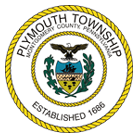Emergency Management
Disasters are extraordinary natural and man-made events which can affect entire communities. Hurricanes, floods, tornadoes and other similar events can strain any municipal agency to its limits and beyond.
In an effort to address such problems and concerns, Pennsylvania law requires that each and every community has in place plans for dealing with such emergencies. These plans help municipal leaders as well as emergency and municipal workers, to prepare for such emergencies, respond appropriately to reduce the loss of life, injury and property damage when the incident occurs and to help the community return to normalcy after the event. These plans address the different types of emergencies that may need to be dealt with and when, where and how to ask for assistance from County, State and Federal Emergency Agencies.
Plymouth Township has had an approved Emergency Plan since the early part of the 1980s. This plan has been updated, drilled and reviewed each year thereafter. The State appointed Emergency Management Coordinator for Plymouth Township is Fire Marshal Mike Matusheski. Fire Marshal Fessler continues his involvement in this effort as an assistant in Marshal Mount’s absence.
Have you sent Plymouth Township your emergency contact information? The form can be downloaded and filled out electronically by clicking here.
This page provides some information regarding Emergency Management and Fire Marshal topics, including some timely fire prevention tips and suggestions.
Winter Safety
During the winter months you may find that due to weather conditions your home doesn’t have power. If this is the case you may decide to use either a portable generator and/or alternative light and heat sources. These can be dangerous so we are providing some helpful tips on the safe use of alternative power and heating sources:
- Keep all people and flammable materials, including kindling, furniture, clothing and pets, at least 36 inches away from fire places and wood stoves.
- Never use an oven or range to heat your home. Never use a gas or charcoal grill inside the home. And gas-fueled portable electric generators must be used outside, never indoors or in an area that allows carbon monoxide (CO), a colorless, odorless and tasteless gas that claims hundreds of lives every year, to collect.
- Open flues before using the fireplace. Fireplaces need screens or doors to keep embers inside. Keep young children away from wood stoves to avoid contact burn injuries.
- Kerosene heaters must never be fueled inside the home or garage; use the recommended grade kerosene and never use an alternative fuel, such as gasoline. Also, supervise children and pets when heaters are used.
- Fuel-burning appliances, such as gas, wood, or kerosene, can emit dangerous levels of CO. Install at least one CO alarm to protect sleeping areas. Have trained professionals inspect and service central heating systems, cook stoves, water heaters and space heaters to prevent CO leaks.
- Candle use presents an increasingly dangerous fire hazard. Use flashlights for emergency lighting. Keep candles away from flammable materials, like furniture and curtains. Do not permit children to keep or use candles in their rooms. Place candles where pets won’t knock them over.
Facts about Fire
Did you know:
- A fire occurs in the US every 60 seconds in a commercial property, every 76 seconds in a residential property
- Smoking, heating and arson are the leading causes of fire deaths in residential property in the US
- If every home had a working smoke detector, an estimated 890 lives could be saved every year in the US
PA Department of Forestry burning bans
If you have been given a permit from the Fire Marshals Office, this is the link that will advise you if a burn ban has been placed in effect in Montgomery County. If a burn ban is in effect you are prohibited from using your outdoor fireplace.
Fire sprinklers save lives
Plymouth Township has had a residential sprinkler ordinance since 1994 requiring residential sprinklers throughout many types of new residential properties. In 2011 all new residential properties are required by the PA Residential Building Code to have residential fire sprinklers. This technology works, saves lives and helps to keep the cost of municipal fire protection low. The following video link provides a very dramatic evidence of the value of residential sprinklers.
For help choosing a sprinkler for your home, see this guide from the Fire Sprinkler Coalition.
http://www.homefiresprinkler.org/index.php/Consumer/quick-guide.html
If you already have a residential fire sprinkler system please make sure that you maintain it. If you’re not sure what maintenance needs to be completed, please feel free to contact the Fire Marshal’s Office for additional information.
Family Disaster Readiness
Emergency plans are only as good as the level of preparation that you do to get yourself and your family ready for a potential emergency that would require you to be out of your home for up to three days. You should prepare your own plan, store some supplies and gather and record information that will allow you to respond appropriately if the need arises. Public safety information is available at the Montgomery County Public Safety website.
Other Helpful links:
- Weather Radar Map Link …
http://www.emergencyemail.org/weatherradarmap.asp - Airport Closing and Delay Link…
http://www.emergencyemail.org/remoteflight.asp - Severe Weather Map Link …
http://www.emergencyemail.org/weathermap.asp



